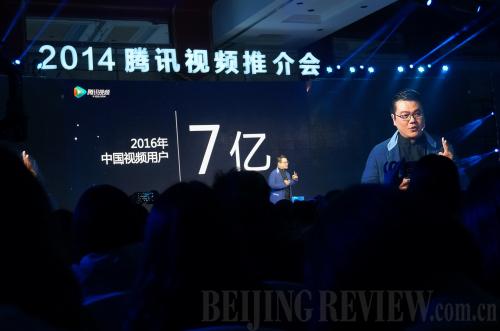|
 |
|
ENVISIONING THE FUTURE: Liu Shengyi, Senior Executive Vice President of Tencent Inc., speaks about the future of China's online video industry during a promotional event held in Beijing on November 26, 2013 (TANG YUANKAI) |
For Hou Yimeng, a fashion designer, online streaming videos are an increasingly important news source. When watching videos online recently, she learned that Danish high-end fur design company Birger Christensen had officially launched its brand in China. Hou immediately forwarded the video to colleagues and friends.
"In the past, I watched TV a lot. If I missed a program when it was aired, I would have missed my chance to find out what happened," Hou said. "Online videos can be watched at any time any place, and you can watch them over and over."
More importantly, compared to the text and pictures that used to dominate the Internet, videos carry much more information.
"People say that a picture is worth a thousand words, but a video clip can say far more than that," Hou commented.
The video about Birger Christensen was shot and broadcast by an Internet service company. Hou said that although it was not edited as professionally as those aired by television stations, the video delivered more information about the brand than a regular TV program because there is no strict time limit for online videos.
Recently, Hou herself shot some videos and shared them online, a trend that more and more people in the country are following.
China now has 604 million Internet users, 67 percent of whom watch online videos, according to a white paper on China's online multimedia industry, which was released at the fifth China Online Audio and Video Industry Forum jointly hosted in December 2013 by the State Administration of Press, Publication, Radio, Film and Television (SARFT) and the Shanghai Municipal Government.
Now hundreds of millions people in China own smartphones, tablet computers and digital cameras and are able to produce videos and distribute them online with software, which has ushered in an era where anyone can be a broadcaster.
Bright prospect
The number of online video users is expected to approach 700 million in 2016 in China, said Peng Bo, Vice Minister of the State Internet Information Office, at the First China Internet Audio-Visual Conference held last November.
China's online audiovisual industry has a market value of 12 billion yuan ($1.98 billion), while online videos have generated advertisements worth more than 9 billion yuan ($1.49 billion), according to the white paper on China's online multimedia industry.
The white paper also showed that netizens spent more time on online videos than on any other Internet services, including social networking websites.
"The online video industry has ushered in its spring time," Peng said. Although no more than five years ago, he was worried about the very survival of the industry.
In the past few years, China's online video industry went through cut-throat competition and witnessed several significant mergers and acquisitions. In August 2012, the country's top two online video companies—Youku Inc. and Tudou Holdings Ltd.—merged and created the largest online video firm in China. Ten months later, Baidu Inc., the largest Internet search engine in China, acquired the streaming video service provider PPS Net TV for $370 million.
According to a report on the development of new media released by the Chinese Academy of Social Sciences in June 2013, of the more than 300 video websites that existed before, only around 20 have survived.
The video websites that have survived the fierce competition seem to be embracing a bright future.
"The introduction of much faster 4G wireless service promises great opportunities for online video companies. The new technologies will bring a boom to videos on mobile Internet," said Guo Fanli, Research Director of CIConsulting, a professional industry research institution in China.
On December 4, 2013, the Ministry of Industry and Information Technology officially granted 4G licenses to three mobile service providers in the country: China Mobile, China Telecom and China Unicom.
| 